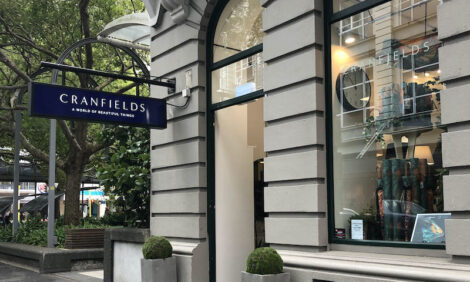
Growing a retail business during a pandemic

Starting out in Wellington in 1991, Cranfields is a family business that’s home to a wide range of quality home interiors. Taking over the business from her mother three years ago, Nicola Cranfields had big aspirations to expand the business. Her plans were coming to life this year, with a new lease for a second store and a trip to Europe in February to source new suppliers and products.
Then came a global pandemic. Cranfields always had a loyal customer base, but the day before the lockdown, customers rushed in to spend store credits and gift vouchers, with the belief the store wouldn’t survive. Nicola had started the hiring process for additional staff, was sitting on two leases and had a container filled with stock ready to be shipped back to New Zealand. In an incredibly bold move, Nicola decided to take a risk and continue following her dream of expanding the business.
Navigating uncertainty
One of the biggest concerns for Nicola was whether she could continue to support her staff. Thanks to the government’s wage subsidy scheme, she was able to keep her team and have comfort knowing they were safe. Looking at the profit and loss report in Xero, it was clear costs had to be cut in order to keep the second store on track. Luckily, both landlords accepted requests for rent relief while the physical stores had to close, which took a lot of pressure off. Nicola’s accountant also offered to reduce their monthly fee, and some suppliers also offered extended terms.
“We were early adopters of ecommerce so we were lucky that our online store was already set up with Shopify and Xero, which made it really easy to operate when the stores had to close – we just scaled it up,” says Nicola.
Supporting the local community
Like many small businesses, a strong sense of community is instilled in Cranfields. A recent study conducted by Forrester Consulting found 69% of consumers feel proud of the small businesses in their communities and would even feel a personal loss if they were to close.
Nicola immediately communicated business continuity plans to her suppliers and reinforced Cranfields’ commitment to honouring all outstanding orders. She also offered to re-home any excess stock that they had.
Driven by a desire to help her community in these uncertain times, Nicola used email newsletters and social media to profile Cranfields’ suppliers. By telling their stories, this created an emotional connection between customers and the people behind the products they were buying.
Pressing ahead with plans for the new Cranfields store, Nicola had a special vision in her mind about how it should look, but she needed some help to bring it to life. A friend who was out of work building film sets came to the rescue, and ended up introducing Nicola to a network of people in the design and trade industries. Within her local community, Nicola was able to tap into other small businesses to set up her dream store.
The day after New Zealand’s first lockdown was lifted, the sense of community shone through as people flocked to check out the new Cranfields store. Since then, support from customers has made it possible to hire more staff and business has been really good. The team has also noticed a shift in the way people shop. Now, customers are showing more of an interest in the products and suppliers, and some are even buying the more expensive items they’ve had their eye on for a while.
“I think spending more time in their homes has inspired people to put more effort into making it a special space, and because people aren’t spending on travel, they can afford to do this,” says Nicola.
Be patient with small business this summer
The current delays in stock coming from overseas is having a significant impact on small businesses like Cranfields. New Zealand suppliers are also waiting on materials, but the delays in shipping and air freight means they are limited on the products they can create in New Zealand.
“December is a strong month for many retailers, it’s where we make up for a quieter January and February, but if we can’t get the stock, this puts a limit on our potential revenue,” adds Nicola.
Nicola made a bold decision to grow her business in a time of huge uncertainty. But thanks to support from her customers, the community and the Government the risk paid off. The two Cranfields stores may be up and running nicely, but the next few months will still bring challenges.
“There’s not a day where I don’t receive an email from an international supplier who is putting their prices up. That’s combined with freight bills that are double what I was paying last year. Because we are importing a lot, we are very exposed to these risks,” adds Nicola.
The small business community needs continued support from consumers, so paying invoices on time and shopping local as often as possible will remain crucial over the next few months.
The post Growing a retail business during a pandemic appeared first on Xero Blog.
Source: Xero Blog






